A simple toothache can sometimes hide a bigger problem. One such condition is a dental abscess — a painful infection that develops when bacteria invade the tooth or gums. Unlike minor cavities or gum irritation, an abscess is a serious issue that demands prompt dental attention.
At our dental clinic in Kolkata, Precision Dental & Implant Centre, our experts say having an in-depth understanding about dental problems can help one have a good overall oral health and take right preventive actions Let’s explore its causes, types, symptoms, risks, and treatment options.
What is a Dental Abscess?
A dental abscess is a pocket of pus that forms inside your teeth, gums, or surrounding bone due to a bacterial infection. It is your body’s way of fighting infection, but the buildup of pus causes pain, swelling, and discomfort. Unlike a cavity or gum irritation, an abscess is a clear sign that the infection has spread deeper and needs medical care.
What Causes Dental Abscesses?
Several factors can trigger a dental abscess, including:
- Untreated cavities that allow bacteria to reach the tooth’s pulp.
- Cracked or broken teeth providing an entry point for germs.
- Advanced gum disease (periodontitis) damaging the tissues around teeth.
- Failed dental treatments, like incomplete fillings or unsuccessful root canals.
- Poor oral hygiene habits leading to plaque buildup and bacterial growth.
- Trauma to teeth or gums, weakening the natural protective barriers.
Even with good brushing and flossing habits, some cases require professional care at a trusted dental clinic in Kolkata or your local dentist to prevent such infections.
Types of Dental Abscess
1. Periapical Abscess
A periapical abscess forms at the tip of a tooth’s root. It usually develops when bacteria enter the inner pulp through deep cavities, cracks, or trauma. The infection travels down the root canals, leading to pus accumulation and swelling. This causes severe, throbbing pain that can radiate to the jaw or ear.
If untreated, the infection may extend into the surrounding bone and tissues. In most cases, dentists recommend Root Canal Treatment (RCT treatment) to clean the infection and save the tooth. In advanced cases, tooth extraction may be necessary.
2. Periodontal Abscess
A periodontal abscess develops in the gums beside a tooth’s root. It is closely linked to gum disease (periodontitis), where plaque and bacteria destroy gum tissue and bone support. This type of abscess often causes red, swollen gums, pus discharge, and a loose tooth.
Unlike periapical abscesses, which start inside the tooth, periodontal abscesses begin in the gum pockets. Treatment involves draining the abscess, deep cleaning (scaling and root planing), and antibiotics to stop the infection. If left unchecked, it can spread quickly and lead to significant tooth loss.
3. Gingival Abscess
A gingival abscess occurs on the surface of the gums, often due to trapped food particles, debris, or foreign objects such as a popcorn kernel. While usually less severe than the other two types, it can still be painful and cause visible swelling in the gum.
The dentist treats it by carefully removing the trapped object, draining the pus, and cleaning the affected area. If ignored, the infection can deepen and turn into a more complicated periodontal problem.
Symptoms of Dental Abscess
Dental abscesses typically cause:
- Severe, continuous toothache.
- Swelling in the face, jaw, or gums.
- Red, tender gums with possible pus discharge.
- Fever, fatigue, or swollen lymph nodes.
- Sensitivity to hot, cold, or pressure.
- Difficulty chewing, swallowing, or even opening the mouth.
- Bad breath or foul taste in the mouth.
What Can Happen if Dental Abscesses Are Left Untreated?
Ignoring a dental abscess can lead to far more than just tooth pain. Here’s what might happen if it is not treated promptly:
1. Spread of Infection
When bacteria are not controlled, they can extend beyond the tooth and gums into nearby tissues. This spread can cause severe facial swelling, redness, and tenderness. In advanced cases, the infection may travel down into the neck or up into the head, complicating treatment and putting overall health at risk.
2. Bone Loss and Tooth Damage
A dental abscess doesn’t just stay in the soft tissue—it can eat away at the surrounding jawbone. Over time, the bone that anchors your tooth becomes weaker and thinner, causing loosening of teeth. The structural damage makes it harder to save the tooth and may require surgical intervention.
3. Tooth Loss
If the infection destroys the pulp and supporting structures, saving the tooth may no longer be possible. In such cases, extraction becomes the only solution. Tooth loss not only affects chewing and speech but may also cause shifting of neighboring teeth and bite problems.
4. Sinus Infections
For abscesses in the upper jaw, the infection can travel into the maxillary sinuses. This leads to sinusitis, which may cause facial pain, nasal congestion, headaches, and fever. Chronic cases are especially troublesome, often requiring combined dental and medical treatments to clear the infection completely.
5. Jawbone Infection (Osteomyelitis)
In some cases, bacteria from an abscess can infect the jawbone itself, leading to a condition known as osteomyelitis. This causes persistent jaw pain, swelling, and fever. Treating osteomyelitis is difficult and may involve long-term antibiotics or surgery to remove infected bone.
6. Systemic Spread (Sepsis)
Though rare, a dental abscess can allow bacteria to enter the bloodstream. This can trigger sepsis, a life-threatening condition where the body overreacts to infection. Sepsis can damage organs and requires emergency hospital treatment.
7. Breathing or Swallowing Difficulties
Severe abscesses can cause swelling that extends into the floor of the mouth, throat, or airway. This may make swallowing painful and, in extreme cases, obstruct breathing. Such situations are considered medical emergencies and need urgent attention.
So, When to Visit a Dentist?
If you experience swelling in the face, fever, or difficulty swallowing, don’t delay treatment. A dental abscess will not heal on its own, and professional care is the only way to stop the infection. Seeking timely help from the best dentist in Kolkata or a trusted dental clinic near you can protect your health and save your teeth.
How to Treat Dental Abscesses?
Treatment depends on the severity of the infection. A dentist may recommend:
- Drainage of the Abscess – To remove pus and relieve pressure.
- Antibiotics – To control and stop the infection from spreading.
- Root Canal Treatment (RCT Treatment) – Removes the infected pulp and saves the tooth.
- Tooth Extraction – If the tooth cannot be saved.
- Pain Relief and Supportive Care – Medications to ease symptoms while treating the root cause.
The right approach will be suggested by your dentist after proper diagnosis.
Dental Cyst vs Dental Abscess: What’s the Difference?
| Feature | Dental Cyst | Dental Abscess |
| Definition | A slow-growing, fluid-filled sac in the jaw or gums. | A pus-filled infection caused by bacteria. |
| Pain | Usually painless until infected or large. | Often painful, throbbing, and sudden in onset. |
| Cause | May form due to developmental issues, impacted teeth, or trauma. | Caused by bacterial infection from cavities, gum disease, or injury. |
| Treatment | Monitored if small; surgically removed if large. | Drainage, antibiotics, RCT, or extraction. |
| Urgency | Often elective unless infected. | Requires urgent treatment. |
Final Thoughts
A dental abscess is not just a dental problem — it is a sign of serious infection that can impact your overall health. With timely diagnosis and treatment, such as RCT treatment, most abscesses can be managed effectively without losing the tooth.
If you’re experiencing symptoms, don’t wait for the pain to worsen. Consult an experienced dentist in Kolkata at once for expert care. Remember, early treatment saves not only your teeth but also your long-term health.

